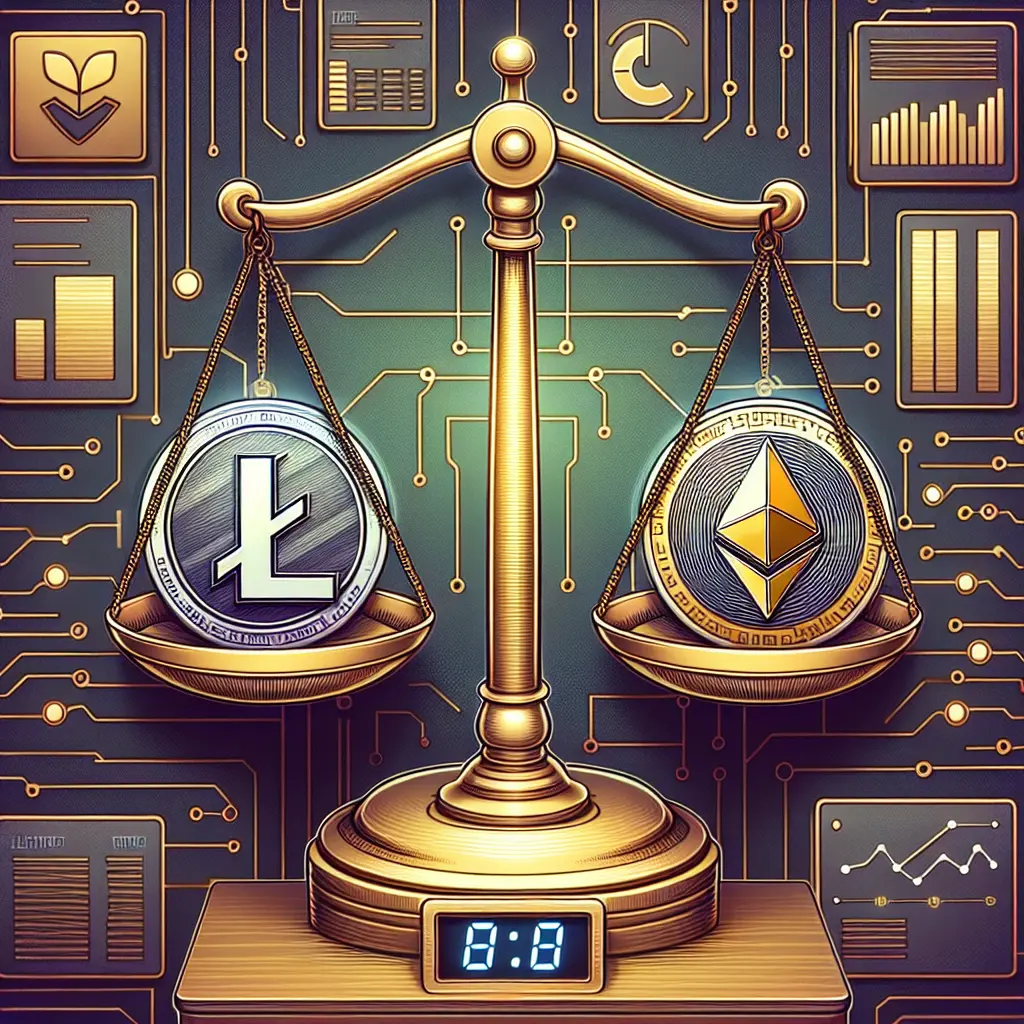
In the rapidly evolving world of digital currencies, Litecoin and Ethereum stand out as two prominent players. This detailed comparison, focusing on various aspects from blockchain technology to cryptocurrency investment potential, aims to provide an insightful look into both LTC and ETH.
Litecoin vs Ethereum: Understanding the Basics
Litecoin (LTC) and Ethereum (ETH) utilize blockchain technology but are designed with different objectives in mind. Litecoin, created by Charlie Lee in 2011, was intended as a "lighter" version of Bitcoin, aiming for faster transaction speeds and lower fees. Ethereum, conceived by Vitalik Buterin and launched in 2015, goes beyond being just a cryptocurrency. It introduces smart contracts that enable developers to build decentralized applications (DApps) directly on its blockchain.
Blockchain Technology and Transaction Speed
The core of both Litecoin and Ethereum is their decentralized nature achieved through blockchain technology. Litecoin can process a block every 2.5 minutes, four times faster than Bitcoin, allowing for quicker transaction confirmations. Ethereum, on the other hand, takes about 13 seconds per block — even faster, which significantly enhances the transaction speed.
Mining Litecoin vs Ethereum
Mining is another area where LTC and ETH differ markedly. Litecoin uses the Scrypt algorithm, which is less susceptible to custom hardware solutions like ASICs, allowing more decentralized and accessible mining. Ethereum initially used a Proof-of-Work mechanism but has plans to shift to Proof-of-Stake with its Ethereum 2.0 upgrade, which aims to reduce the environmental impact of mining by eliminating the competitive, computational-intensive aspect of transaction validation.
Crypto Market Trends and Investment Potential
Investing in cryptocurrency requires an understanding of market trends. Recently, Litecoin has seen significant activity with over $2.85 billion in large transactions, indicating strong interest from whales (large holders). This could be a sign of growing confidence in Litecoin as a store of value or a preferred medium for large transfers.
Ethereum benefits from its broad adoption among developers creating DApps and its long-standing position as the leading platform for smart contracts. The recent dip in Solana’s sentiment might push more developers and investors towards Ethereum, reinforcing its position in the market despite current scalability issues.
Smart Contracts and Decentralized Applications (DApps)
Ethereum's introduction of smart contracts was revolutionary, allowing it to host DApps across various sectors from finance to gaming. This has established ETH as more than just a cryptocurrency – it's a foundational technology for decentralized internet. Litecoin, while not originally designed with smart contracts in mind, has begun exploring this area with OmniLite in 2021, though it still trails behind Ethereum in this domain.
Scalability Issues
Both networks face scalability challenges. Ethereum has been notorious for high gas fees during peak usage. However, the upcoming Ethereum 2.0 promises to address these issues by improving its transaction throughput. Litecoin does not currently face such severe scalability issues due to its faster block generation time, but it may need to evolve its technology as it gains more users.
Crypto Wallets Compatibility
When it comes to storing and managing these cryptocurrencies, users have numerous wallet options available that support both LTC and ETH. Compatibility with popular crypto wallets like Ledger Nano X, Trezor Model T, and MetaMask ensures that users can securely manage their assets across different platforms.
Litecoin Advantages and Ethereum Benefits
Litecoin’s primary advantages include faster transaction processing times and lower transaction costs compared to Bitcoin, making it an attractive option for micro-transactions and everyday use. Ethereum’s benefits lie in its robust support for smart contracts and DApps, fostering a rich ecosystem of applications that extend far beyond mere currency use.
Recent News Impacting Litecoin and Ethereum
Recent trends and news have also shaped the narrative around these cryptocurrencies. Notably, reports have highlighted concerns over the environmental impact of cryptocurrency mining, likening it to traditional mining’s health detriments. Such issues are particularly pertinent for Ethereum as it transitions to a less energy-intensive consensus mechanism.
In terms of investments, negative sentiments around platforms like Coinbase could hint at broader market shifts, potentially affecting both LTC and ETH prices. Additionally, social media trends suggest a growing FOMO around Litecoin, which might influence short-term price movements but requires cautious interpretation.
Conclusion: Which Is the Better Investment?
Choosing between Litecoin and Ethereum for investment purposes depends on individual risk tolerance, investment timeline, and interest in the broader technological capabilities offered by Ethereum’s platform versus the more straightforward use case of Litecoin as digital silver. Both offer unique advantages and come with specific risks influenced by market dynamics.
As we navigate through these evolving crypto landscapes, staying informed and understanding each cryptocurrency's underlying technology and market position will be crucial for any potential investor or enthusiast.
Happy investing!
June Hicks